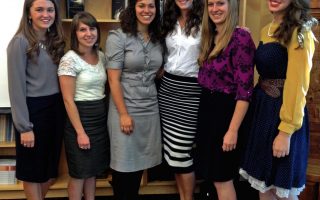Megan Armknecht Megan presented on how Louisa May Alcott was influenced by German Romanticism–specifically the German thinker and writer, Johann Wolfgang von Goethe. She had noticed resonances between Goethe’s thinking and personality in the character of Dr. Bhaer in Alcott’s classic, Little Women, and wanted to find out if these connections meant anything and if …
Psychological and Financial Benefits of “Slowing Down”
We can obtain a lot of information instantly. We can check email, find the weather forecast, take a photo, make a purchase, all in a matter of seconds. The rapidity of modern–or digital–life is convenient; it makes us more efficient and frees up time to accomplish other things. It’s hard to believe that there might …
Celebrate National Arts and Humanities Month
On September 30, President Obama declared October 2014, National Arts and Humanities Month. This is the 29th year in a row that October has been dedicated to celebrating Arts and Humanities. In his proclamation, Obama wrote, “Since our earliest days, America has flourished because of the creative spirit and vision of our people. Our Nation …
Brian Roberts’s study of American literature leads him to Indonesia.
Over the past several years, Professor Roberts has collaborated with Dr. Keith Foulcher (Indonesian Studies, University of Sydney) to research American writer Richard Wright’s 1955 travel to Indonesia to attend the Asian-African Conference, a landmark meeting of representatives from twenty-nine postcolonial Asian and African countries. In May 2013, with funding from the Kennedy Center for …
75 Years After His Death, Has Freud Slipped Out of Our Conscious?
If you ask a psychologist, they will tell you Freud is obsolete. His theories have been debunked. The Oedipus Complex? Nonsense. Psychotherapy? Not helpful. But this week, Michael S. Roth, President of Wesleyan University, says otherwise in a piece he wrote for the The Chronicle of Higher Education entitled, “Why Freud Still Haunts Us.” Rather …
Fall 2014
All Colloquia will take place in JFSB 4010 at 3:00pm unless otherwise specified. September 11 David Grandy (Philosophy) The Dearest Freshness Deep Down Things’: The Philosophical and Poetic Depths of Science September 18 Dirk Elzinga (LEL) How do you say —– in Hopi? How the Deseret Alphabet was used to document an indigenous language of …
Should Thomas L. Friedman and Google Go Back to School?
Yesterday morning I read a couple articles that, in relative juxtaposition, conspired to trigger this response. One was an innocuous piece about some high schooler getting suspended for asking the school’s visiting lecturer to prom during an assembly. The speaker happened to be Miss America. The other was a well-intentioned New York Times op-ed by Thomas Friedman …
Kenyan novelist/professor Ngugi wa Thiong’o visits BYU
English Reading Series, Wednesday, April 2, 12:00 p.m, HBLL.
Video Gallery
LECTURES INTERVIEWS ANNUAL SYMPOSIUM
Colloquium/WSTAR Talk
Nancy Armstrong, the Gilbert, Louis, and Edward Lehrman Professor of English at Duke and also editor of the prominent journal Novel: A Forum on Fiction. Her talk is entitled, “Bio-Political Jane Eyre”. Wednesday , March 19, 12pm, JFSB 4186/88.
































































































































































































































































